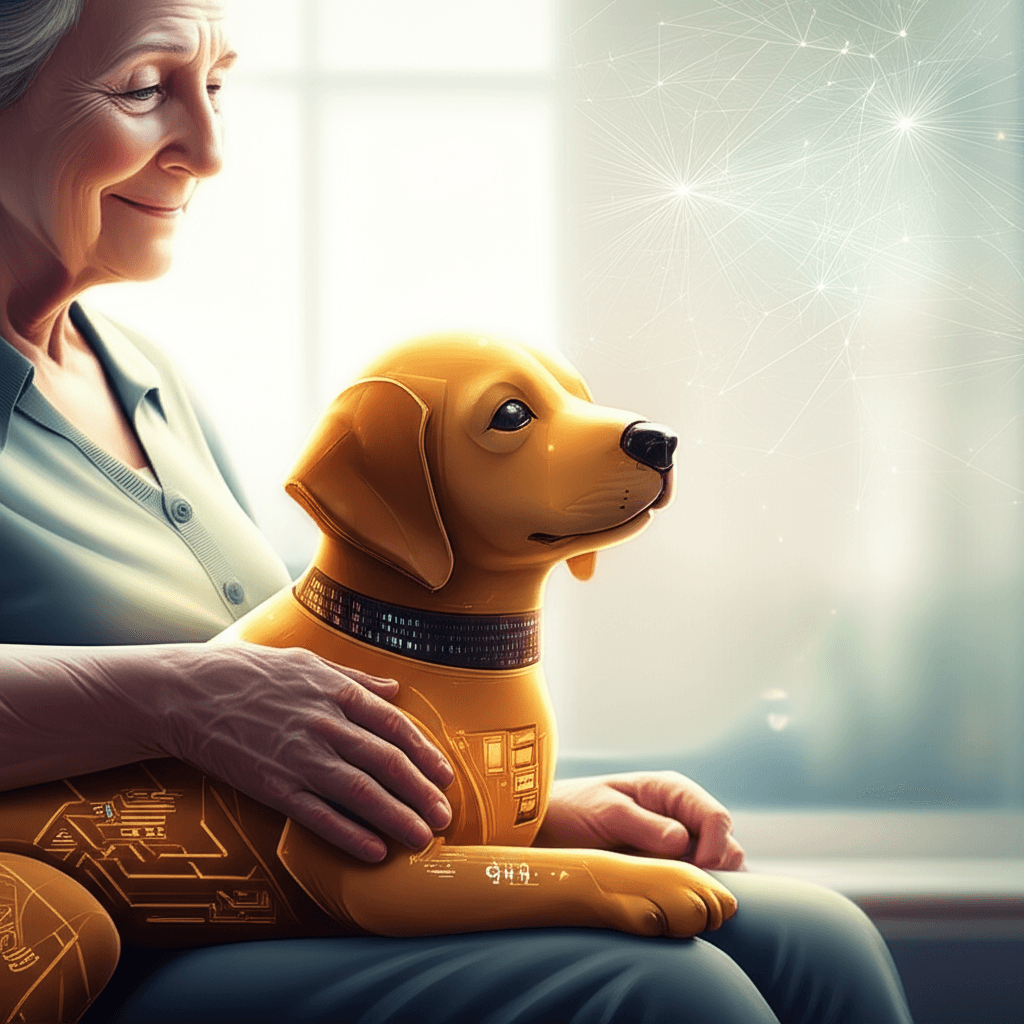AI Robotic Puppy Jennie Secures Millions to Revolutionize Dementia Care
Inspired by personal need, this AI robotic puppy, backed by millions and research, offers comfort to seniors with dementia.
June 27, 2025

A hyper-realistic, AI-powered robotic puppy named Jennie is offering a new form of companionship and comfort to seniors with dementia, a development that has captured both public interest and significant financial investment.[1] The company behind Jennie, Tombot, recently secured $6.1 million in a Series A funding round led by Caduceus Capital Partners.[2] This investment will be used to finalize engineering, obtain regulatory and safety certifications, and begin shipping the robotic companions to a waiting list of over 16,000 customers.[2] The golden retriever-like puppy, which responds to touch, voice, and movement, represents a growing trend in the use of social robots to address the complex needs of an aging population, particularly those affected by cognitive decline.[1][2]
The creation of Jennie was born from a personal experience. Tombot CEO Tom Stevens was inspired to develop the robotic pet after his mother was diagnosed with Alzheimer's disease and could no longer care for her dog safely.[3][4] Realizing a significant gap in the market for suitable alternatives, Stevens embarked on creating a lifelike companion that could provide the emotional benefits of a live animal without the demanding responsibilities of pet ownership.[3][5] To achieve a high level of realism, Tombot collaborated with Jim Henson's Creature Shop, known for its work on the Muppets.[1][3] The result is a robotic puppy that can emulate the sounds and movements of a real dog, including barking, whining, wagging its tail, and responding to its given name through a smartphone app.[4] The robot is outfitted with touch sensors that allow it to differentiate between a gentle caress and a more vigorous pet, responding accordingly with AI-generated sounds and movements.[1][4] Designed to be a lap dog, Jennie does not walk, a deliberate feature to prevent it from becoming a tripping hazard for individuals with limited mobility.[3]
The application of robotic pets in dementia care is supported by a growing body of research highlighting their therapeutic benefits. Studies have shown that interaction with these companion robots can lead to a range of positive outcomes for individuals with dementia, including reduced agitation, anxiety, and loneliness.[6][7][8] For people living with dementia, the predictable and non-judgmental nature of a robotic pet can create a sense of safety and provide emotional support.[6] The simple act of stroking the robot can increase endorphins, helping to reduce stress and improve overall well-being.[6] A 2021 study from Florida Atlantic University found that dementia patients who interacted with robotic cats showed improved moods, with over half demonstrating slight to moderate improvements in areas like attention and language.[7] Similarly, a 2022 study published in the Journal of Holistic Nursing reported a significant reduction in loneliness and an improvement in depression among residents of a care facility who interacted with robotic pets.[7] These robots can also facilitate reminiscence therapy by evoking memories of past pets.[7]
The development and deployment of robotic companions like Jennie carry significant implications for the AI and healthcare industries. Tombot aims for Jennie to become the first robotic puppy registered as an FDA medical device, which would pave the way for its use in hospitals and other formal care settings.[1][9] This move signals a broader shift towards integrating AI-driven technologies into standard medical care, particularly for non-pharmacological interventions. The use of robotic pets can also lessen the need for certain medications used to manage behavioral symptoms of dementia.[8][9] However, the introduction of robots into elder care is not without ethical considerations. Experts raise concerns about the potential for reduced human contact, deception, and a loss of dignity for elderly individuals.[10] There is a risk that these robots could be used to justify leaving residents alone for longer periods, potentially increasing social isolation.[11] Therefore, the successful and ethical implementation of this technology will likely depend on its use as a tool to enhance, rather than replace, human interaction and care.[11]
In conclusion, the emergence of robotic pets like Jennie, backed by substantial investment, marks a pivotal moment in the intersection of technology and elder care. By providing comfort and companionship to seniors with dementia, these AI-powered animals offer a promising, low-maintenance alternative to live pets.[6] Numerous studies support their potential to improve mood, reduce anxiety, and enhance communication in individuals with cognitive decline.[7][12] While the industry must navigate important ethical questions regarding the role of robots in caregiving, the continued development of these technologies suggests a future where AI plays an increasingly integral role in supporting the well-being of vulnerable populations.[10][13] The journey of this robotic puppy from a personal inspiration to a well-funded commercial product underscores the growing recognition of technology's potential to address profound human needs.
Sources
[1]
[3]
[4]
[5]
[7]
[9]
[10]
[11]
[12]
[13]